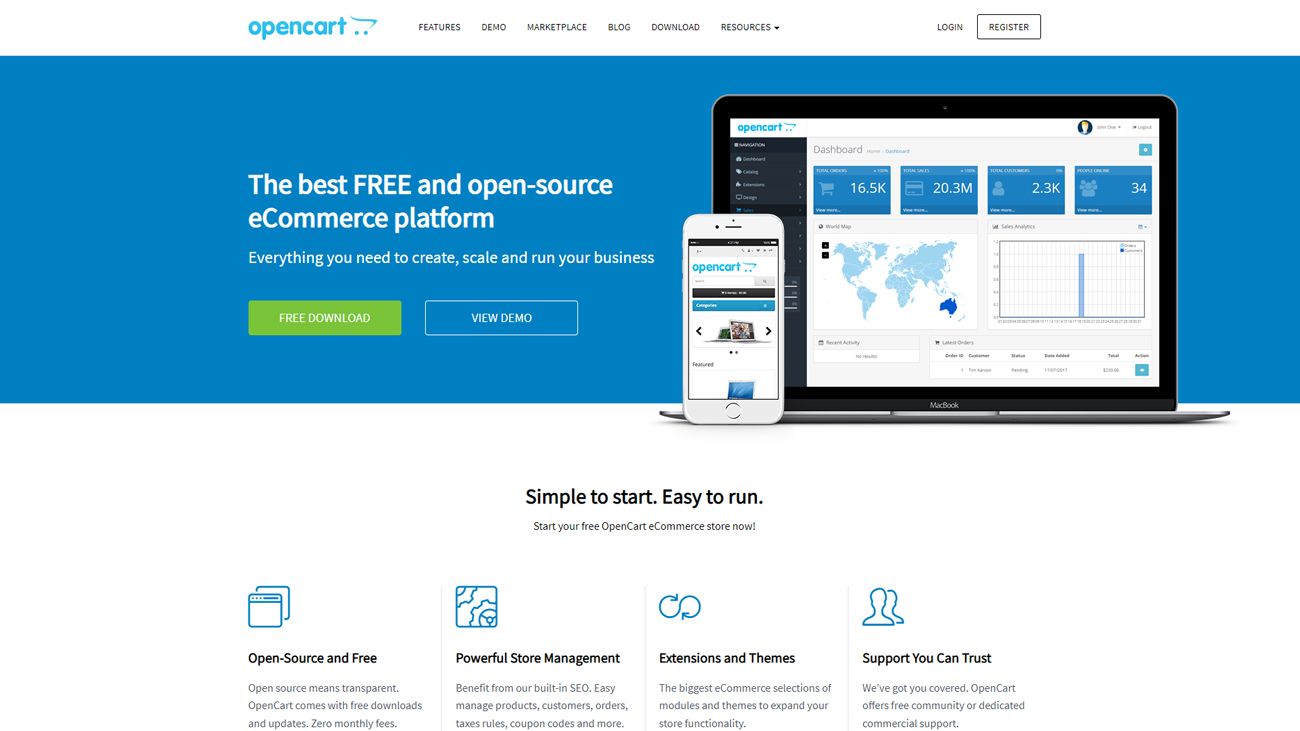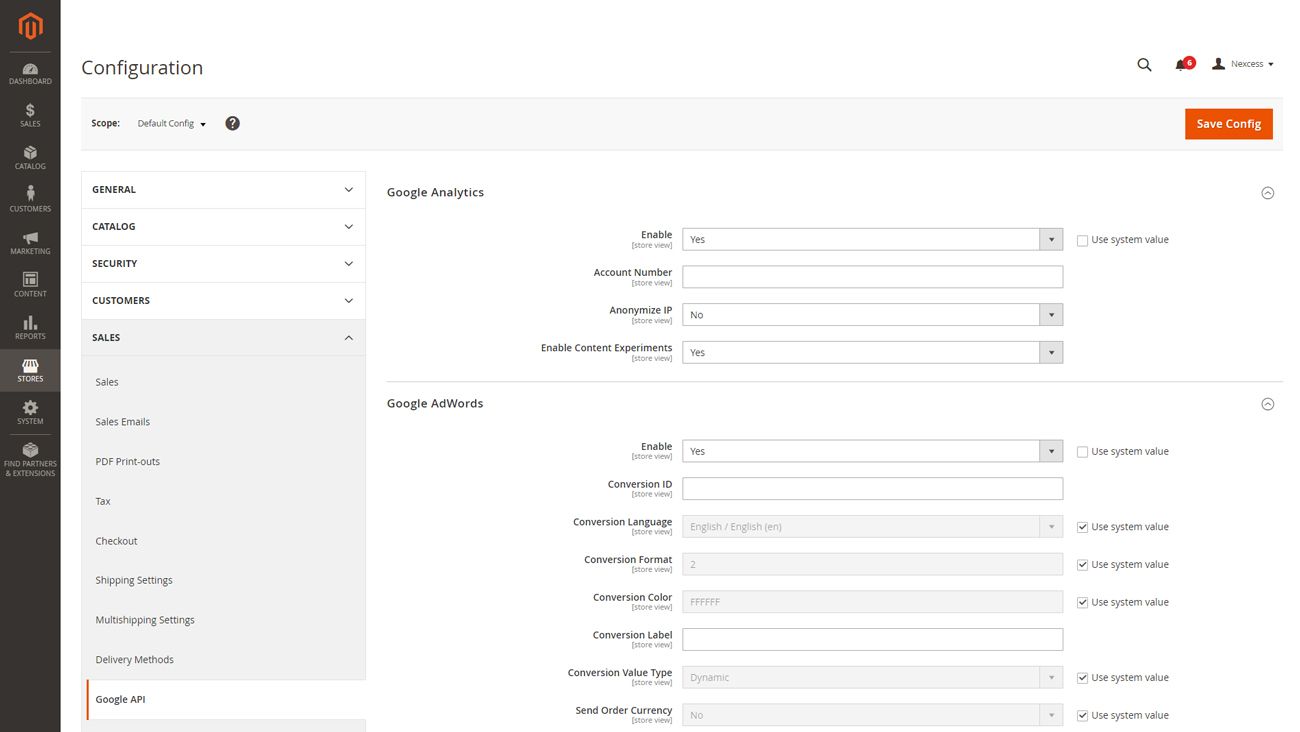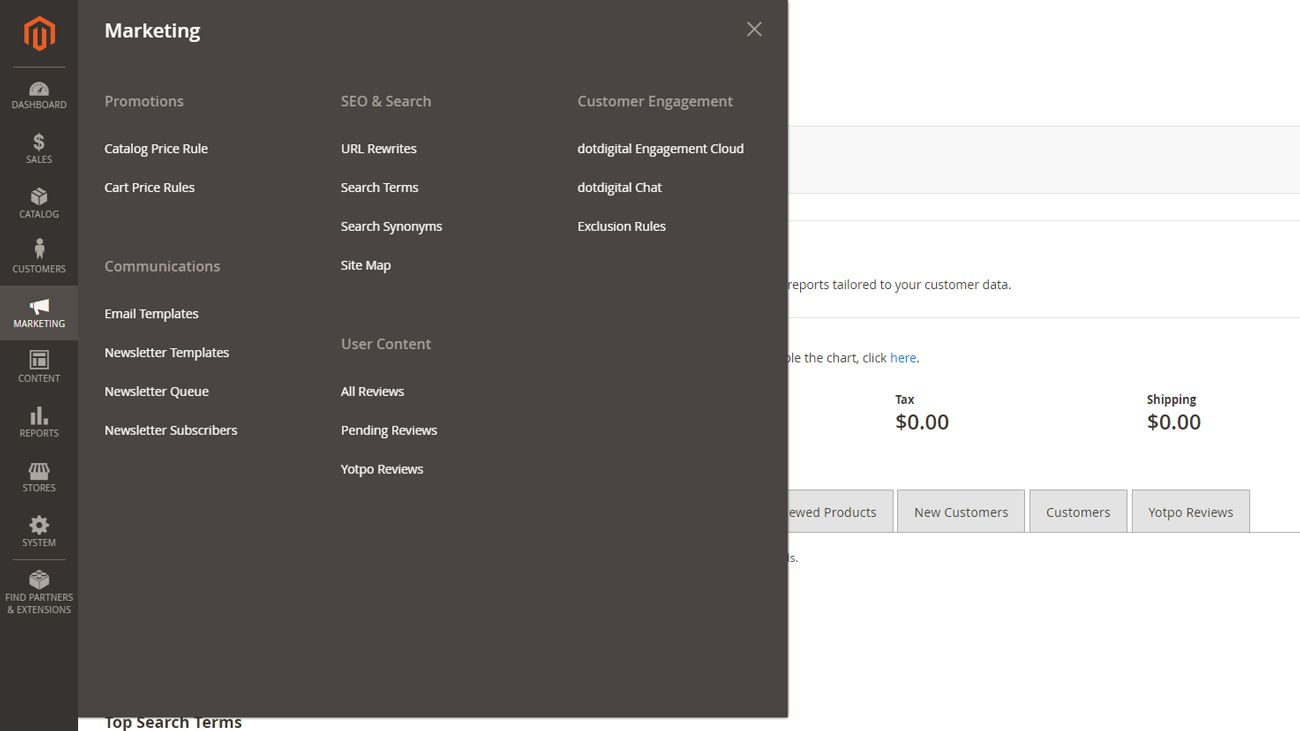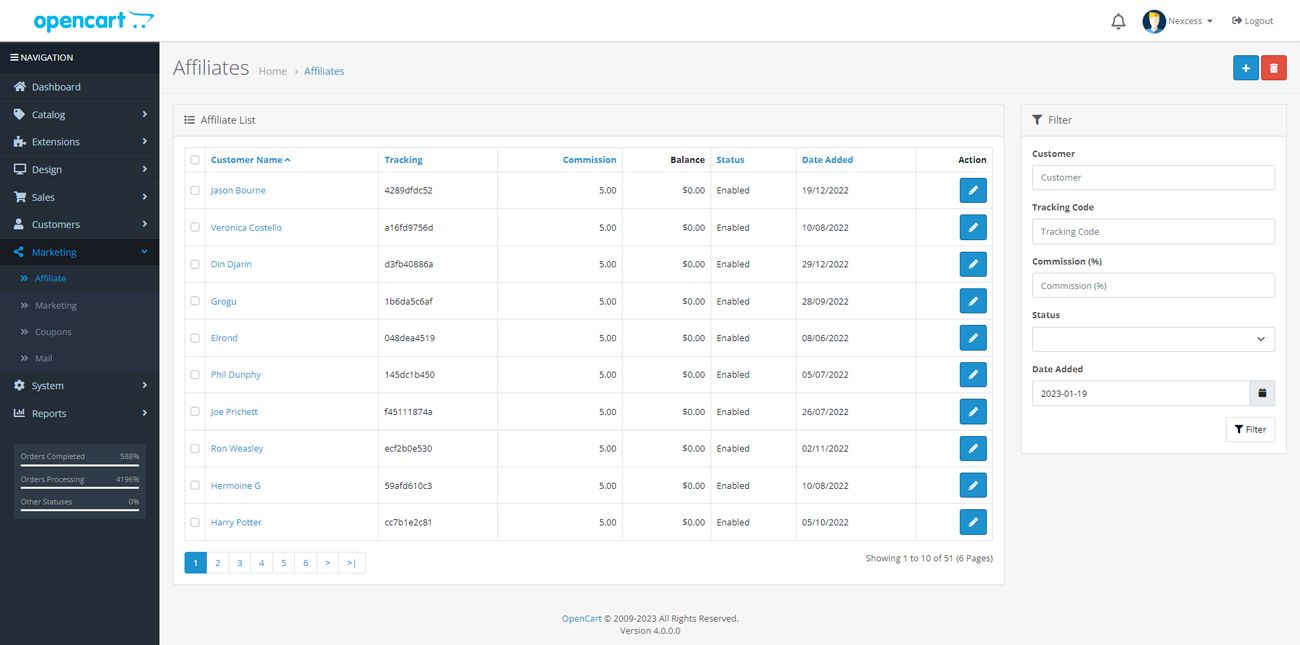Choosing between Magento and OpenCart isn’t easy.
Both are PHP-based, open source platforms that offer intuitive dashboards, flexible catalogs, and extensible codebases. Plus, both solutions have large ecosystems of users, developers, and solution providers.
So how do you decide which is better for your online business? Read the rest of our Magento vs. OpenCart guide to find out.
We’ll explain everything you need to know about Magento and OpenCart, including their strengths and weaknesses, cost considerations, and security features to help you choose the best one.
Let’s start with the basics.
What is Magento?

Magento is an open source ecommerce platform that provides a wide range of features such as catalog management, order management, customer management, and checkout. It has a modular architecture that makes it easy to customize the platform’s functionality.
Magento is available in two editions:
- Magento Open Source: A free version with essential ecommerce functionality.
- Adobe Commerce: A paid, enterprise version with advanced features like AI-powered product recommendations and customer segmentation.
Magento Open Source has everything needed to start an online store. It supports unlimited products and can serve thousands of concurrent customers.
In contrast, Adobe Commerce gives you more advanced features, enterprise-grade hosting, and technical support from Adobe.
Both Magento editions support multiple API technologies like REST, GraphQL, and SOAP. That makes it easy to integrate a Magento store with third-party CRMs and ERP systems.
Get fully managed Magento hosting
Accelerate your store's potential, without the tedious maintenance
Pros of Magento
There are several advantages of using Magento, such as:
- Code-free content management: Magento’s page builder tool lets you manage content and customize page layouts without code, exactly the way you would with SaaS platforms like Shopify and BigCommerce.
- Powerful product management: Magento supports multiple product types and enables you to customize the product selection interface for your customers with 10+ unique input options like dropdowns and visual swatches.
- Advanced inventory management: Magento lets you assign, track, and manage multiple inventory sources for products. It allows you to create low-stock alerts and provides detailed reports for insights into your store inventory.
- Optimized checkout: Magento minimizes cart abandonment with a one-step checkout module that lets customers place orders without navigating multiple tabs or pages.
- SEO-friendly features: Magento simplifies ecommerce SEO with features like structured data, custom URL structures, metadata, URL rewrites, and built-in support for sitemap and robots.txt files.
- Comprehensive security: Magento employs multiple security measures such as two-factor authentication and custom admin URLs. It also lets you accept online payments securely with integrated payment gateways.
Cons of Magento
Magento has a few cons, such as:
- Steep learning curve: You can only install and update Magento extensions from the command line. Although you don’t need coding skills, you must know your way around a terminal to perform those tasks.
- Expensive: The cost of hosting a Magento store can range from $50 per month to several thousand, depending on the store size. Moreover, hiring a Magento developer for custom development can cost anywhere from $100 to $1000 per hour.
- No support: Magento’s open source version doesn’t receive any technical support from Adobe. When things go wrong, your only options are to reach out to the community via Stack Exchange and the official Magento forum or learn PHP, MySQL, and other Magento technologies to fix things yourself.
What is OpenCart?

OpenCart is an open source platform that provides basic ecommerce features like catalog, products, and order management. It is free to use and has a lightweight, extensible codebase.
OpenCart is an excellent solution for businesses that need an online store with a low operating cost. It offers useful features like affiliate management, reward points, and multi-currency support that are perfect for direct-to-consumer brands.
Moreover, OpenCart is just as customizable as Magento. It has an API for integrations and even provides the option of managed cloud hosting starting from £25 (approximately $31) per month.
Pros of OpenCart
OpenCart offers many benefits, such as:
- Easy module management: OpenCart lets you manage its core modules from the admin panel. You can disable unwanted modules to reduce bloat and free up server resources.
- Code-free store administration: Like WooCommerce, OpenCart allows you to install and manage extensions from the admin panel. It integrates with the OpenCart marketplace, so you can browse, purchase, and download extensions without leaving the admin dashboard.
- Multiple support options: OpenCart provides various support options. You can access its online resources and community forums for free and sign up for dedicated support for $120 per month.
- Large online marketplace: OpenCart’s official marketplace contains more than 13,000 extensions and themes. Plus, you can buy OpenCart themes and extensions on third-party marketplaces.
- Built-in affiliate marketing tools: OpenCart empowers you to create affiliate marketing programs with custom tracking codes, commissions, and payment methods without third-party extensions.
- Easy backups: OpenCart lets you create and download on-demand backups of your store database. You can individually select database tables for backups and restore them in minutes without technical skills.
Cons of OpenCart
OpenCart has a few cons, such as:
- Poor documentation: OpenCart’s online documentation lacks detail. It doesn’t explain hardware requirements, basic store setup tasks, or OpenCart security in a beginner-friendly way.
- Limited product management features: OpenCart doesn’t support grouped or bundled products. It also lacks support for multiple inventory sources and low stock alerts.
- Complex product creation workflow: OpenCart’s configurable product creation workflow doesn’t allow you to generate product variations quickly. You can only create them individually or in bulk using a .csv file.
Cost considerations for Magento vs. OpenCart
Magento is more expensive than OpenCart because it’s more resource-intensive. However, despite higher hosting costs, Magento provides more features than OpenCart.
Magento lets you use powerful search technologies like Elasticsearch and OpenSearch. It also offers a code-free content editing tool, more product types, and advanced shipping configurations.
Adding those features to OpenCart would require multiple extensions and more hosting resources to keep it fast and responsive.
We’ll discuss Magento and OpenCart hosting options in a bit. First, let’s compare the initial costs of building a basic Magento and OpenCart store.
| Expense | Magento | OpenCart |
| Hosting (Monthly) | $50 | $25 |
| Theme (One-time) | $200 | $200 |
| Extensions (2) | $250 | $250 |
| Basic SEO | $0 | $50 |
| Maintenance & Support (Monthly) | $250 | $180 |
| Security (Yearly) | $200 | $200 |
| Total | $950 | $905 |
Building a Magento store is more expensive. But Magento provides more features than OpenCart. You should choose OpenCart if upfront costs are your primary concern and Magento if you need more functionality.
Security concerns for Magento vs. OpenCart
Magento and OpenCart are self-hosted software that put you in charge of online store security. Both provide security features like custom admin URLs, HTTPS support, and user access management. But only Magento offers advanced features like:
- Two-factor authentication: Magento enables two-factor authentication by default for all admin users.
- CAPTCHA: Magento offers CAPTCHA validation to protect storefront forms and the admin login page from brute force attacks.
- Data encryption: Magento uses AES-256 encryption for sensitive data like customer and payment information and Secure Hash Algorithms for non-sensitive data.
- Strict content security policies: Magento uses strict content policies to prevent card skimming and clickjacking attacks.
- Cross-site scripting and cross-site request forgery protection: Magento’s core framework employs input validation, output encoding, and secure form keys to protect against code injection attacks.
- Free security scan tool: Adobe offers a free online tool that lets you perform over 21,000 malware tests on your store and provides suggestions to improve your Magento security.
OpenCart’s security documentation only shares essential security tips like updating file system permissions and .htaccess files. In comparison, Magento’s security documentation offers detailed guides that help you secure your store in multiple ways.
Despite that, you can work around the security concerns of Magento and OpenCart by using a managed hosting provider that handles security for you. That way, you can use either platform without worrying about server security.
Digital marketing and SEO tools for Magento vs. OpenCart
Magento offers SEO features such as product templates with structured data markup, metadata optimization, URL rewrites, automatic redirects, and sitemaps. It shines as a marketer-friendly ecommerce platform with built-in Google Adwords and Analytics integration.

Magento lets you set up A/B tests using Google Optimize, previously known as Content Experiments. You can test different page designs and copy variations to find what works best and optimize your marketing strategies in real-time.

Magento’s Marketing menu includes flexible price rules, newsletter management, and search performance reporting.
It also offers a dedicated reporting tool for insights into marketing data like search terms, abandoned carts, conversions, and newsletter transmissions.
In contrast, OpenCart’s SEO and marketing features seem limited.
You get all the essentials like custom metadata, URL rewrites, sitemaps, and robots.txt files. Yet, you miss out on important features like A/B testing, Google Analytics integrations, and custom price rules.
OpenCart includes a coupon module that lets you offer discounts on specific products and categories.
But it doesn’t compare to Magento’s price rules that are capable of Buy One Get One, Buy X Get Y, and free shipping promotions.

The only noteworthy marketing feature in OpenCart is the affiliate module that supports custom discounts and tracking codes. Besides that, Magento is a better platform for ecommerce marketing and SEO.
Magento vs. OpenCart themes
Magento and OpenCart offer free responsive themes and tools to design progressive web applications (PWAs) for a native app-like shopping experience.
That ensures you don’t need a dedicated mobile app for your store.
Both platforms have official marketplaces where you can buy third-party themes to enhance the look of your store.
However, the official Magento theme store has only six free and paid themes, whereas OpenCart has over 1,000.
Adobe’s strict quality control program ensures every theme on their marketplace passes multiple quality checks before being listed. OpenCart has no such programs, so it’s easier for developers to list themes on OpenCart’s marketplace.
That doesn’t mean you can’t design an attractive website with Magento. You can buy hundreds of professionally designed themes for both Magento and OpenCart on third-party marketplaces like Templatemonster and ThemeForest.
The only major difference between Magento and OpenCart’s frontend design capabilities is their ability to support headless websites.
Magento’s APIs and powerful backend functionality make it more suitable for building a headless website than OpenCart.
Hosting plans for Magento and OpenCart
Magento and OpenCart are open source ecommerce platforms that you can host on different types of servers, such as shared, virtual private, and dedicated servers. However, both platforms have distinct hosting requirements.
Magento is a complex platform that performs best on servers with lots of processing power and memory, whereas OpenCart is a lightweight platform you can host on a small shared server. The exact costs of hosting either platform will depend on the store size and type of hosting.
You can host a small OpenCart store for $20 per month and a large store for upwards of $150 per month. On the other hand, you’ll probably spend anywhere from $50 per month for a small Magento store to over $1,000 for a large store.
Self-managed solutions like Amazon Web Services and DigitalOcean are cheaper for hosting an online store. But they don’t handle server security, optimization, or provide any platform-related support.
Managed hosting providers like Nexcess handle the maintenance and security of the hosting environment and allow you to focus on growing your online business.
Bottom line on Magento vs. OpenCart
Data from BuiltWith indicates there are more than twice as many live OpenCart websites on the internet as Magento. However, when you filter by the top 1 million, 100,000, or 10,000 websites, there are ten times as many Magento websites as OpenCart.
OpenCart is an excellent choice for small businesses that need a no-frills ecommerce platform that’s easy to host and maintain. But Magento is more scalable and future-proof.
Magento offers marketing automation tools, easy Google integrations, comprehensive security, and code-free content management. The only downside to Magento is that hosting it without technical expertise can be difficult.
Managed Magento hosting with Nexcess helps you overcome that challenge with secure and optimized servers. You get proactive security, on-demand backups, and 24/7/365 support from real humans.
Want to learn more? Browse our fully managed Magento hosting plans to get started today.

